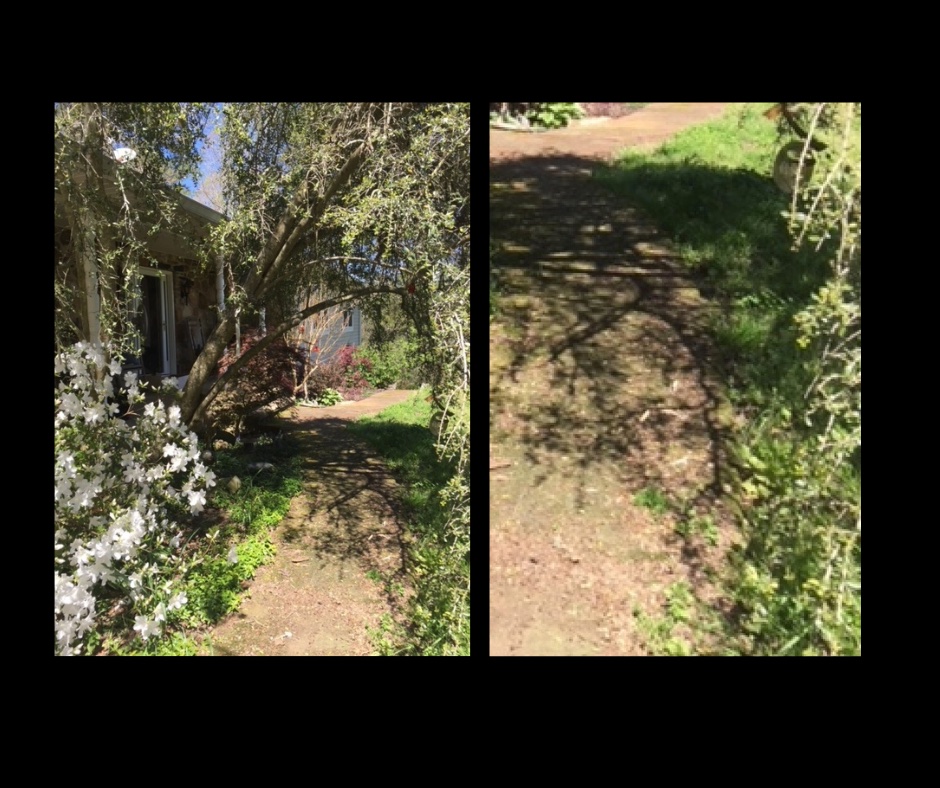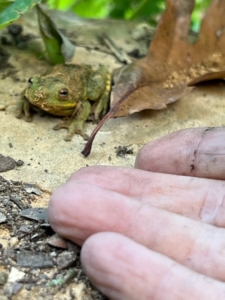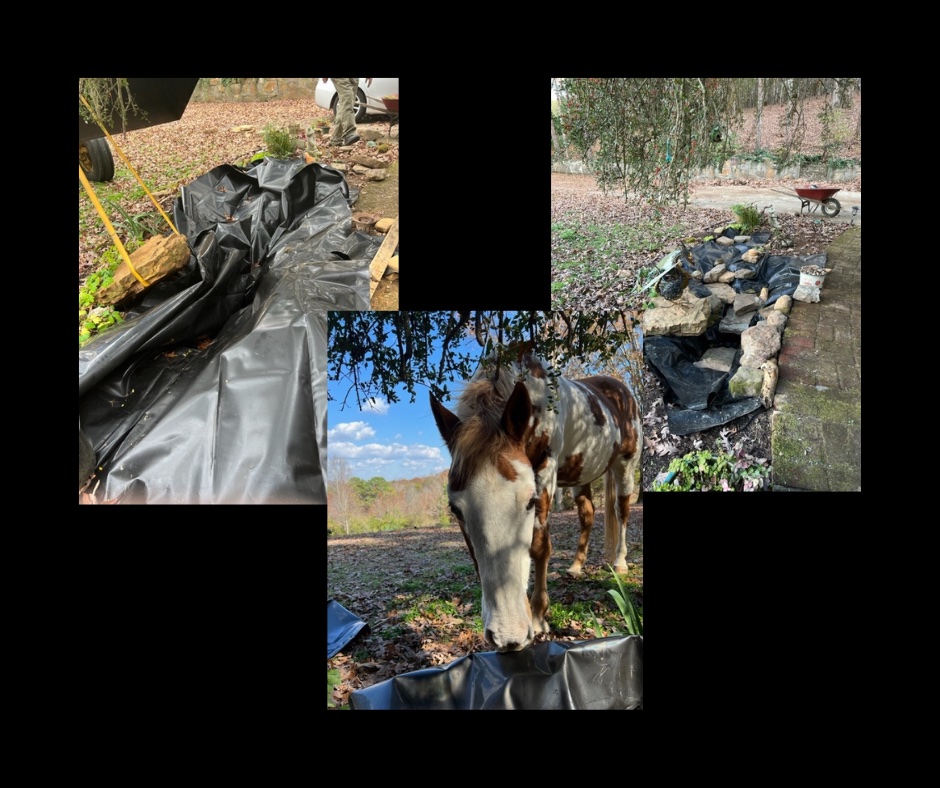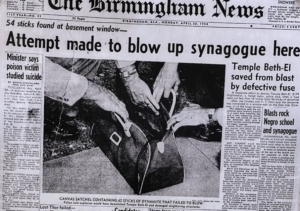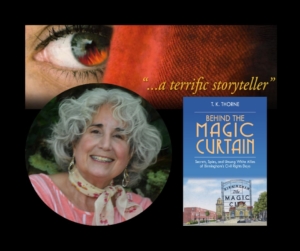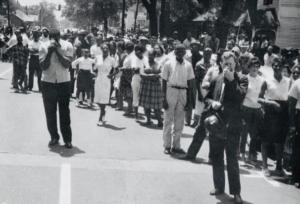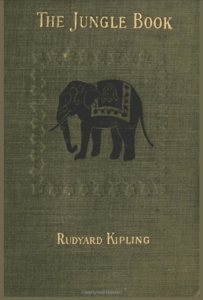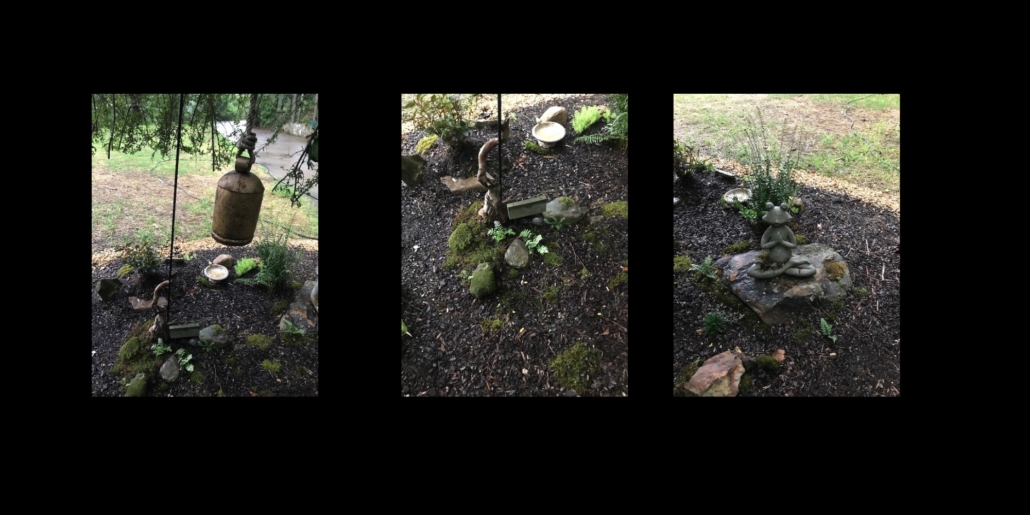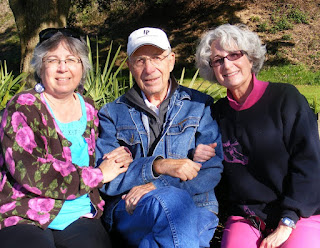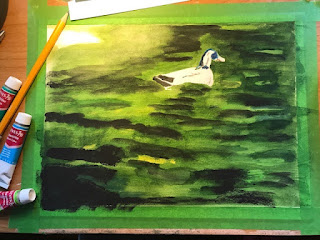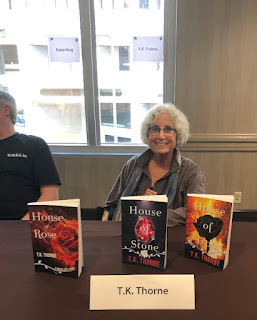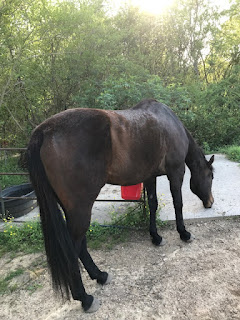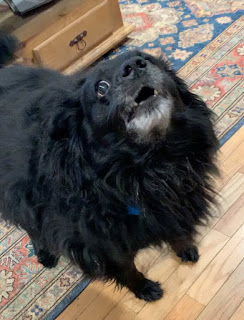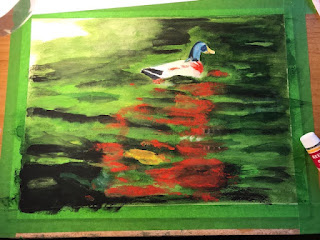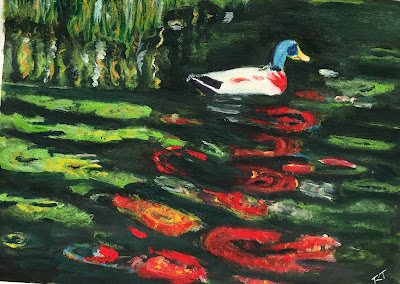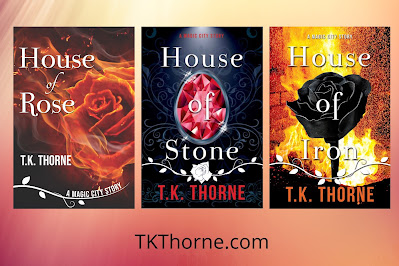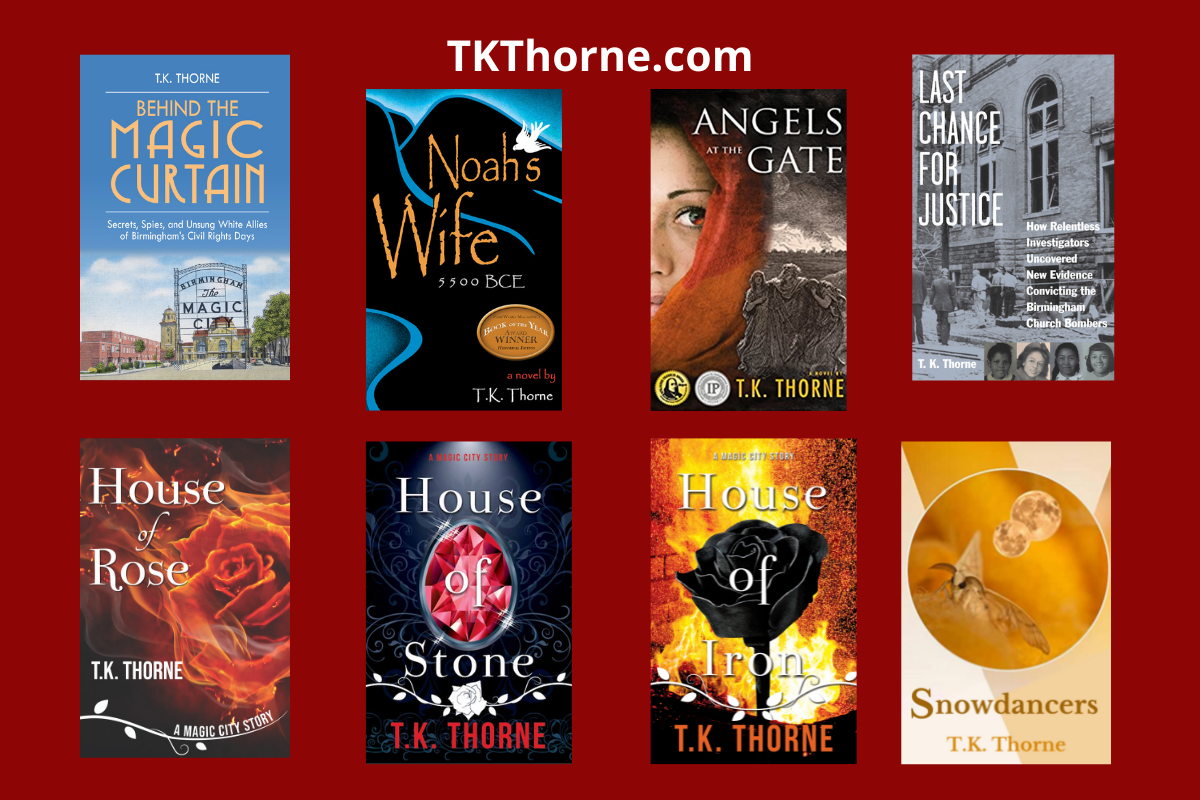Chicago Angels—by T.K. Thorne
This is a true and funny story that happened a few years ago. It’s about angels and life and Bob.
I was thrilled that my book had won a national award but didn’t think it was worth a trip to Chicago just to get a photo made. Sister Laura, however, was hyped about it. She had worked hard with little credit—editing, designing the original awesome cover, marketing, and supporting me at every step of my novel about the wife of Lot (Angels at the Gate). She also wanted us to attend the BEA (Book Expo America), which was happening simultaneously.
A few days before our flight, Laura fell and hurt her ankle. BEA requires lots of walking, but she was determined to go, even if she had to get a wheelchair. Where most people would have rented one, my always-check-a-thrift-store-first sister borrowed an old wheelchair from a thrift store. It was heavy and squeaky, and not knowing its history, she had cleaned it with Lysol, which was a prudent sanitary move but, unfortunately, set off the explosive-substance detector at the Birmingham, Alabama airport.
So, wheelchair, Laura, and all of her stuff had to be hand searched. And they confiscated our wheelchair, in case it was really a bomb, I guess, promising it would be at the gate waiting for us when we arrived in Chicago.
Not.
No wheelchair at the gate when we landed in Chicago. Had it exploded somewhere? We finally track it down in baggage. After a start like that, we are surely over the hump. All we have to do now is get outside the terminal because Laura has arranged for her friend, Bob, to pick us up. I’d never met Bob, but he was Laura’s friend. What could go wrong?
Bob, it turns out, is 82 years old. His car is about the same age and smells strongly of gasoline. I have visions of someone in front of us throwing out a lit cigarette. Are we going to explode after all? Will the Lysol on the wheelchair add to the incendiary mix?
Bob hops out and loads us up, pulling stuff randomly out of the hatchback area to get our suitcases and the wheelchair in and then crams piles of boxes on top of them, keeping the hatch down with bungee cords. When we get in the car, I politely mention that the boxes totally block his vision on one side.
“I’m used to it,” he says, pulling out into the rain and the insanity of the Chicago airport traffic.
The “it” he is “used to,” I realize, is not being able to see . . . omg!
I text our hostess. *Landed. If we survive Bob, will be there soon.*
Miraculously, Bob gets us where we are going, an area several miles north of Chicago in Edgewater, where Laura has arranged rooms at a friend’s cousin’s condo. Why, my always-check-a-thrift-store-first sister had reasoned, stay at an expensive hotel? It is a lovely place, but this is the award night, and I am worried about us getting back into Chicago. That ride was not part of the Bob-bargain, so we are on our own. That’s a good thing, right?
At Laura’s insistence, we forgo a taxi because we are so far away, but Laura has called the Chicago Transit Authority, and they assured her that all the metro train stations are handicap accessible. Still, it is no longer raining, and we leave the condo early, me pushing the squeaky, cumbersome wheelchair that I learn randomly applies its right brake and jerks hard to the right. I should have had a clue that the plans made by a woman who borrowed a wheelchair from a junk shop, not to mention, Bob, might warrant follow-up. When we arrive at the nearest station, we find there is, indeed, a way to get a wheelchair into the station. But “handicap accessible” does not stretch to a way to ascend the many stairs to the subway platform.
Reversing course, we head to next station down the line, which does have an elevator and where we meet a nice young man with the Chicago Transit Authority who helps us up to the platform. I ask his name.
“Angel,” he says.
My first thought is how appropriate—the name of my book is Angels at the Gate! WAIT! The name of my book. . . omg, I have forgotten a copy of my book (necessary to hold when getting picture taken at awards.) The last thing the publicist said was, “Don’t forget a copy of the book for the photo.”
I leave Laura on the platform with Angel, hurrying back to the condo. By this time, my feet are aching in my boots (which I am wearing because my skirt rises too far in front for knee-high stockings, and I will die before wearing pantyhose.)
I grab a copy of my book and switch my boots for sandals. Still need the socks, because this is Chicago, not Birmingham. I look down to see two bright pink big toes peeking out through holes in the socks.
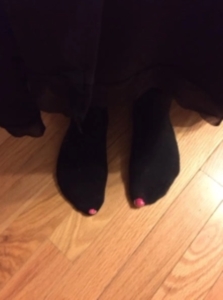
Whoops, sandals not going to work for photo opt. I grab boots for later donning. By the time I get back, we are running late. We set the brakes on the wheelchair but, besides randomly engaging, they are not that spiffy about staying engaged. At the first lurch, Laura rolls down the aisle. I am running after her trying to catch her before she crashes at the other end.
A second angel jumps from her seat and shows us how to lock in the wheelchair. Who knew? We are from Alabama.
The clock is ticking. The whole purpose of the event is to get that photo op. We are a long way from our stop, the closest one to the (Sears) Willis Tower with an elevator.
As we discuss strategy for when we exit, a third angel pops up from her seat—apparently getting a signal from above (or perhaps watching our entrance) that there are some Alabama girls in need of assistance—and plops into the seat next to me.
“You’re going to Willis Tower? I work near there.” She kindly explains which way to walk from our next stop. We are so late now that we must take a cab.
Holding our breath against the olfactory assault in the train elevator (known as a subway by locals, even when it is above the ground), we descend to the street. I step out into the roadway and hail a cab for the first time in my life. (Again, I live in Alabama; a household is incomplete without two cars and a pickup truck.) A cab stops and looks us over, shaking his head at the wheelchair and driving on. I hail another cab, who also shakes his head at the wheelchair. We push on to Willis Tower, rolling through the puddles and treachery of cracked sidewalks. We are now very late.
I push the rickety wheelchair as fast as I can until we hit a crack in the sidewalk that stops us dead, shoving the wheelchair handles into me and nearly dumping Laura, book, and boots onto the sidewalk into a puddle because, yes, of course, it is now raining again.
Willis (Sears) Tower is massive. We enter and proceed via elevator to a winding corridor down to the security station, surely close to our goal, only to find we are at the wrong door and have to be escorted through the labyrinth of the Tower to the service elevators in order to reach 99th floor and the Independent Publisher’s party and awards announcement. We are finally here! We register, pick up our ID’s and a program . . . from which we learn “Historical Fiction” is #15 on the list and they are now announcing #26.
We missed it. All the way from Alabama to Chicago . . . and WE MISSED IT!
I wheel Laura to the bathroom. I feel worse for her, since she really wanted this, and it is as much her award as mine because cover design and layout are also considered, along with the story and writing.
While waiting for her, I notice we are sort of “backstage” to the awards announcer, and a beautiful young woman is standing (on the stage) with her side to me, so close I could touch her with a step. She is obviously connected to the proceedings. Hearing one of my father’s oft-repeated life lesson in my head— Only the squeaky wheel gets the grease— I take that step and tap her shoulder between photo setups, whispering that we had difficulties and just arrived, and is there any way we could go out of order? She steps out of the big room and consults a list, asks my name.
“T.K. Thorne.”
She brightens. “Oh, you are T.K. Thorne? I loved your book!”
“You read it?”
“Yes, I really loved it; it was my favorite book out of all of them.”
There are 80 national categories. No idea how many submissions in each category or how many she actually read, but that’s a lot of books, even if she meant in my category. As far as I am concerned, I am happy.
Dianu. (Hebrew for “it is enough.”)
She graciously arranges for us to get called up, Laura hobbling at my side. They put a huge medal worthy of the Olympics around my neck and, to my delight, around Laura’s too. And I have the book in hand! Success! Photo snaps.
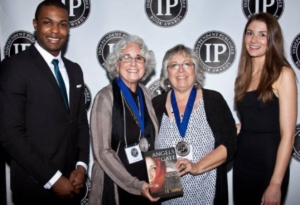
You wouldn’t have even seen the pink toes. We head to the bar.
View out the Willis Tower, drink in hand View out the Willis Tower, second drink in hand

Over the next several days we encounter angels and references to them in rather odd ways. In addition to the transit guy named Angel, another “angel” (whose friend is Angela) shows me how to use Uber (Yea! No more wheeling for blocks to the train station); the Egyptian uber driver mentions his son’s name is translated as “Angel in Heaven”; and a book publicist at the Book Expo America (BEA) advises me to “listen to my angel.” I keep looking for a flutter of wings out of the corner of my eye!
On our last day, Bob picks us up, and we load wheelchair and baggage. After bungee-cording his car hatch down (not because of our luggage, just normal procedure), we are off to the airport with an extra hour . . . just in case. It is bitter cold, but I roll down my window because I can’t afford losing any more brain cells from the fumes. There is so much stuff in this car, it is unidentifiable. I try not to think about what all could be in there and just hope there are no rodents that live near my feet. This time I am in the back seat, and I reach for the seat belt. I actually find one, but there’s no buckle, so I just loop it around one shoulder. There’s a chance if we hit something at just the right angle, it might help. Laura is in the front seat. “What’s that noise?” she asks, forehead wrinkled in concern. Is it the engine?
“I don’t know,” Bob says. “Haven’t heard that one before.”
Laura: “Sounds bad.”
Bob: “Unless the wheels fall off, I usually just turn up the radio.”
I couldn’t make this up.
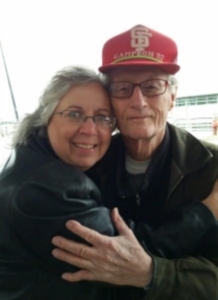
Postscript: Despite appearances, Bob was one of the many Chicago angels, for sure. He has spent most of his life traveling around the world helping people in disasters, which is how he and Laura met. I really wish I could spend more time with him and hear his stories . . . just not in his car.
![]()
T.K. Thorne writes about what moves her, following a flight path of curiosity, reflection, and imagination. Check out her (fiction and nonfiction) books at TKThorne.com


